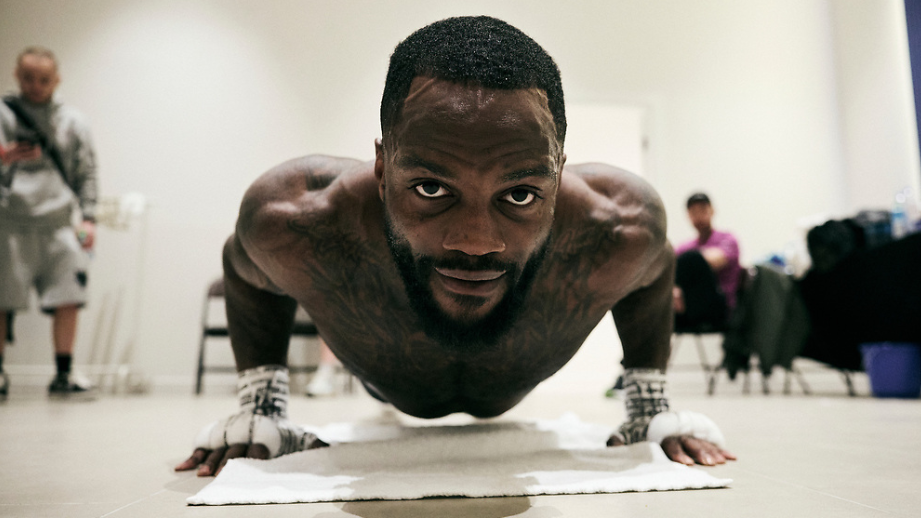“I’m born alone and I’m going to die alone, so go on your own journey.”
That statement from British light-middleweight Ishmael Davis might appear blunt at face value, but his harsh view on life was developed through some difficult formative years.
By the age of 14, Davis had been kicked out of school, kicked out of his childhood home and was adapting to the responsibility of caring for newborn twin sons.
“I had a bit of a rough upbringing,” Davis tells BBC Sport.
“I was living with my first baby’s mum at 14, went into a hostel until I was 15 and then I got my own flat.
“Because I wasn’t making money it was hard. I was only getting around £100 every two weeks. It was a hard time in my life but these are the things I’ve had to come through.”
Davis, now 30, first stepped into a boxing gym aged 12 and took part in an unlicensed amateur fight the following year, but any dreams of pursuing the sport further were shelved as he tried to provide for his children.
Despite still being a child himself, Davis turned to the streets of Chapeltown in Leeds to make ends meet.
“I was year nine when I had my first kids. After that I wanted to be out on the streets all the time and I got into gangs,” Davis says.
“Because I had kids young, I started selling drugs.”
Davis would land himself in prison not long after and was on the path some of his closest friends and family were walking.
On 15 November he faces Sam Gilley for the British and Commonwealth light-middleweight titles on the undercard of Chris Eubank Jr v Conor Benn at Tottenham Hotspur Stadium as he looks to get his career back in track after three losses in his past four fights.

‘I told them they would see me on TV’
Davis has fought on some major bills over the past 14 months, including on the Daniel Dubois v Anthony Joshua undercard and Oleksandr Usyk v Tyson Fury card.
Both late-notice fights ended in defeat and Davis also lost a majority decision against Caoimhin Agyarko in September.
But the chance to appear on a grand stage was too good to turn down for a fighter who almost missed out on the chance to turn professional after he was convicted of selling Class A drugs.
“I would train for three days but then not go back for a while – I was in the streets,” says Davis, who returned to the win column with a unanimous decision victory against Elliot Eboigbe in October.
“I did that until I was about 18 or 19, when I got sent to jail and did 11 and a half months.
“I got out from Deerbolt (prison) and 10 months later I was recalled to jail for an argument, so I went back in for four months.”
Davis’ first stint in prison left him with the sobering realisation that he needed to make serious changes to his lifestyle.
Pugilism, he believed, could be his way out, although training to be a boxer in prison was not easy.
No-one there – guards or inmates – thought he could be a successful boxer.
“The turning point was my friend and my cousin got locked up for murder and I thought ‘I don’t want that’, so I put my all in boxing,” Davis says.
“You can’t get boxing equipment in jail, so we used to make pads by cutting bits off the mattress.
‘I love being a role model’
After leaving prison for the second time, Davis moved away from Chapeltown to avoid being dragged back into old habits.
He made his professional debut in 2018.
“Chapeltown – it’s like a fish tank,” Davis said.
“Role models are a big thing for a teenager and what you see you will follow. I grew up seeing gangs, drugs, cars, clothes, alcohol and weed, so that’s what I followed.
“I’m still friends with all the people that I grew up with. I live my life and they live their life.
“I’m still the same – the only thing that has changed is my own mission and my own path.”
Next weekend’s bout is the top priority for Davis as he looks to get the most out of his boxing career and maximise his earning potential.
However, Davis, who is now a father of six, also wants to set a good example and give back to his community.
“Now I’m older, being a role model and being able to speak to people about a different way of living is a big thing I want to do,” he says.
“I’ve been through a lot – it’s real what I say. I know some kids are misled and end up in gangs, and I’ve been there. It helps for someone like me to speak to them.
Related topics
- Boxing
- 30 October

- 28 April 2024

More boxing from the BBC
- 16 August

Source: BBC

Leave a Reply